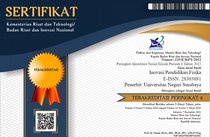PENGARUH PENERAPAN MODEL PEMBELAJARAN PROBLEM SOLVING TERHADAP HASIL BELAJAR SISWA KELAS X PADA MATERI ARUS LISTRIK DI SMA NEGERI 1 KEDUNGPRING, LAMONGAN
Abstract
The formulation of the curriculum in many countries to put the development of problem-solving skills as a development priority. Brief statement that is used as the application of problem-solving students presenting become core of the competencies. Therefore conducted on the influence of the application pnelitian learning model of problem solving on student learning outcomes in the matter of electrical current. The purpose of this study to analyze the effect of application of the learning model of problem solving on the results of class X student of electrical current to the material in SMA Negeri 1 Kedungpring, Lamongan, describing the activity of class X in SMAN 1 Kedungpring Lamongan through teaching and learning activities with problem solving learning model on the matter electric current. This experimental study design was a pretest posttest control group study with a population of as many as five classes of class X and the sample consisted of one class of experiments (X3), and a control class (X4). Homogeneity of the sample analysis performed by the homogeneity test grades and showed a homogeneous distributed population. Aanalisis t test two parties on the cognitive aspects of acquired tcount X4 class of 28.38 with a t Table at 2.00, this suggests that the experimental class learning outcomes better than the control class because tcount> t Table obtained while in the psychomotor domain of the average grade control and experimental class of 70 by 82, for the affective domain of the average value of the experimental class of 97 while the control class for 78. While the value of science process skills to control class to own an average of 79 and grade 93 for experimental results show that student learning outcomes through the application of the learning model of problem solving better than students learning outcomes through the application of conventional models with an increase of 11.17% on the cognitive, psychomotor domain of 12.5% for and 15.21% for the affective domain.
Keywords: problem solving, learning outcomes, an electric current.
Abstrak. Rumusan kurikulum di berbagai negara menempatkan pengembangan keterampilan memecahkan masalah sebagai salah satu prioritas pengembangan. Pernyataan singkat yang digunakan seperti siswa mepresentasikan penerapan pemecahan masalah menjadi kompetensi utama. Oleh karena itu dilakukan pnelitian tentang pengaruh penerapan model pembelajaran problem solving terhadap hasil belajar siswa pada materi arus listrik. Tujuan penelitian ini untuk menganalisis pengaruh Penerapan model pembelajaran problem solving terhadap hasil belajar siswa kelas Xpada materi arus listrik di SMA Negeri 1 Kedungpring, Lamongan, mendeskripsikan aktivitas siswa kelas X di SMAN 1 Kedungpring Lamongan melalui kegiatan belajar mengajar dengan model pembelajaran problem solving pada materi arus listrik. Rancangan penelitian eksperimental ini adalah control group pretest posttest dengan populasi penelitian sebanyak 5 kelas dari kelas X dan sampel terdiri dari satu kelas eksperimen (X3), dan satu kelas kontrol (X4). Analisis homogenitas sampel dilakukan dengan uji homogenitas nilai rapor dan menunjukkan populasi berdistribusi homogen. Analisis uji t dua pihak pada aspek kognitif diperoleh thitung kelas X4 sebesar 28,38 dengan ttabel sebesar 2,00, hal ini menunjukkan bahwa hasil belajar kelas eksperimen lebih baik dari pada kelas kontrol karena thitung>ttabel sedangkan pada ranah psikomotor diperoleh rata-rata kelas kontrol sebesar 70 dan kelas eksperimen sebesar 82,untuk ranah afektif nilai rata-rata dari kelas eksperimen sebesar 97 sedangkan kelas kontrol sebesar 78.sedangkan nilai untuk ketrampilan proses sains untuk kelas kontrol memeliki rata-rata sebesar 79 dan kelas eksperimen sebesar 93 Hasil penelitian menunjukkan bahwa hasil belajar siswa melalui penerapan model pembelajaran problem solving lebih baik daripada hasil belajar siswa melalui penerapan model konvensional dengan peningkatan sebesar 11,17% pada ranah kognitif, 12,5% untuk ranah psikomotor dan 15,21% untuk ranah afektif.
Kata kunci: problem solving, hasil belajar, arus listrik
 Abstract Views: 19
Abstract Views: 19 PDF Downloads: 35
PDF Downloads: 35










